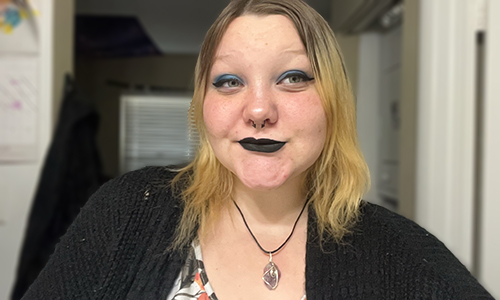Youth and Young Adult Stories that Inspire
Youth and young adults across Virginia speak out about their stories of hope and resilience despite great challenges. Facing their fears, they turned experience to action and sought community and connection in programs like SPEAKOUT and Project LIFE. They found kindness, friendship, mentorship and instruction that supported them from foster care to adulthood.
Fariha's Testimonial

My name is Fariha Rahman and I am 24 years old. In my journey from foster care to adulthood, I discovered the profound importance of resilience, healing and self-discovery. After aging out of foster care in 2018, I became a member of SPEAKOUT, Virginia’s youth-led advisory board. I played a vital role in restructuring initiatives and policies within the Virginia Department of Social Services. I helped launch seven new initiatives focused on increasing better outcomes for youth in foster care. Additionally, my work as a Lived Experience Leader with Thriving Families, Safer Children contributes to a $6 million grant project aimed at supporting underprivileged communities.
However, my journey was not always smooth. The emotional complexities of aging out of foster care often weighed heavily on me. Foster care is isolating, and you feel lost. But even as I felt lost, I always looked for kindness. I found the power of community and affirmation when I joined SPEAKOUT. From the start, the adults and members treated me with respect and dignity. That solidified my self-worth right there.
In the absence of a connection to my Asian roots, culture, traditions and community were feelings of self-doubt and a lack of self-awareness. The pain of this separation made it difficult to find pride in myself and my achievements.
Despite these challenges, I persevered. Craving connection and understanding, I sought out people with backgrounds like mine. The kindness of my peers and my independent study of philosophy became a guiding force in my life, emphasizing the importance of self-acceptance. I learned that understanding and liking oneself is crucial, especially for those who have faced the unique challenges of foster care.
I enrolled in Northern Virginia Community College and joined the Great Expectations program. The program provided me with educational resources and a sense of belonging during the turmoil of the COVID-19 pandemic. My academic journey has been anything but ordinary; I researched a variety of fields to study. I started with criminology, ventured into chemistry and ultimately fell in love with physics. I am working on my associate’s degree in science and planning to pursue a bachelor’s degree in physics.
My advocacy work with SPEAKOUT has also been pivotal to my growth. This space allowed me to contribute positively to my community, growing in leadership roles and reinforcing my sense of purpose. Through SPEAKOUT, I discovered a supportive community that treated me with respect, dignity and kindness, solidifying my self-worth.
In my quest to heal, I immersed myself into my culture, forming relationships with peers who had faced similar obstacles. I met youth who looked like me with experiences like mine and aspirations of becoming doctors and engineers. They inspired me to embrace my past instead of seeing it as a limitation. The study of philosophy has also been instrumental in helping me navigate life’s complexities. I believe that everyone is unique, shaped by our innate interests and skills. My life’s purpose is to fully experience existence, foster meaningful connections and love deeply.
I hope my story resonates with others who have moved from uncertainty to uncertainty. While the journey from foster care to adulthood is isolating and hurtful, I continue to heal. I came to know the power of community and learned that kindness is a powerful force that does exist in this world. Today, I continue to explore my identity, recognizing that on the other side of adversity lies self-discovery and opportunities for growth. If you are reading my story and facing similar challenges, I encourage you to embrace your past, accept the power of community, and cultivate all of the potential that lies within you. If I can make it, you can too.
Lacey's Testimonial

My introduction to foster care was as difficult as it was sudden. As the paperwork was finalized, I remember feeling abandoned, taken from the only home I've ever known and put into a new, entirely unknown environment. I felt guilty, too; I had never been away from my sister and cousins, and I’d always prided myself in being responsible for them. As I entered this uncertain new chapter, I felt that I was leaving them to fend for themselves.
At the beginning of our separation, my sister and I were allowed to keep in contact with each other. But over time, our visits and calls started to dwindle until eventually there was no contact at all. My phone calls and texts went unreturned. It was the loneliest and most isolating period of my life. Although I understood it was not my fault, I continued to feel guilty and responsible for her well-being. It felt like I had left her alone and unprotected, and I feared she might experience the same challenges that I went through myself.
Despite these difficult circumstances, I did not allow myself to wallow in negativity. Over time, I was able to come to terms with my inability to control the factors that shaped these challenging years. All my life, I had been told – and sometimes told myself – that I couldn’t and wouldn’t amount to anything. In my darkest times, I didn’t plan to see age 18 or even graduate from high school. But this hopelessness blossomed into determination. I learned that, though I could not control the world around me, I could control my reactions. I started using everything that had happened to me to in my past as fuel to overcome obstacles.
Following these lonely but formative years in foster care, I finally began living independently. The transition from foster care to adulthood was fraught with anxiety, as previous periods of great change had been traumatic. However, with time, I began to thrive. I joined SPEAKOUT and surrounded myself with people who cared and were willing to teach me the skills that I needed to succeed. My social worker and mentor encouraged me to apply for jobs. I started working for the Viriginia Department of Social Services as an ETV (Education and Training Voucher) administrative specialist, and ultimately landed my current job with Project LIFE.
While living independently, I quickly realized that if I acted like an adult, I would be treated like one. After I aged out of foster care, I was working, had an apartment, could clean, and pay bills. For so long, I had seen myself as a ward of the state where I was always reliant on someone else to help me. Now, I was trying to figure out who I was outside of the label I had given myself. It was a very challenging time in my life because I wasn’t prepared for the emotions that came with aging out. In spite of the many strides I had made, the loneliness and isolation periodically crept back in to my life, reminding me of where I’d come from.
Looking back, I realize the extent to which I was shaped by my experiences – the positive, the negative, and the in-between. I went through a number of great challenges throughout my time in foster care, but I wouldn't be the resilient person I am today without them. As I endured and grew from these times, I learned to love and accept myself for the strong, persistent person I am.
I not only survived, but thrived, and now I get to use my life experiences to help other children in the position I once occupied. I've reconnected with my sister and learned how important it is to be surrounded by a group of people that listen to and understand you. I owe a lot to my team at Project Life, too. Having peers, mentors and social workers who genuinely care about me and my future truly kickstarted my journey forward. I've even created my own family and developed healthy boundaries to protect us. My life may not have looked like everyone else's, or even like the life I imagined for myself, but I am at peace with who I am – and who I am becoming.





